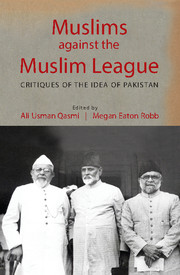Book contents
- Frontmatter
- Contents
- Acknowledgements
- Introduction
- 1 Maulana Husain Ahmad Madani and the Jami'at ‘Ulama-i- Hind: Against Pakistan, against the Muslim League
- 2 The Partition Conundrum: Perspectives, Experiences and Ambiguities from qasbahs in India
- 3 Choudhary Rahmat Ali and his Political Imagination: Pak Plan and the Continent of Dinia
- 4 Differentiating between Pakistan and Napak-istan: Maulana Abul Ala Maududi's Critique of the Muslim League and Muhammad Ali Jinnah
- 5 Advising the Army of Allah: Ashraf Ali Thanawi's Critique of the Muslim League
- 6 The Illusory Promise of Freedom: Mian Iftikhar-ud-Din and the Movement for Pakistan
- 7 Visionary of Another Politics: Inayatullah Khan ‘al-Mashriqi’ and Pakistan
- 8 Nonviolence, Pukhtunwali and Decolonization: Abdul Ghaffar Khan and the Khuda'i Khidmatgar Politics of Friendship
- 9 Islam, Communism and the Search for a Fiction
- 10 Muslim Nationalist or Nationalist Muslim? Allah Bakhsh Soomro and Muslim Politics in 1930s and 1940s Sindh
- 11 Dancing with the Enemy: Sikander Hayat Khan, Jinnah and the Vexed Question of ‘Pakistan’ in a Punjabi Unionist Context
- 12 Religion between Region and Nation: Rezaul Karim, Bengal, and Muslim Politics at the End of Empire
- 13 ‘The Pakistan that is going to be Sunnistan’: Indian Shi'a Responses to the Pakistan Movement
- 14 The Baluch Qaum of Kalat State: Challenging the Ideological and Territorial Boundaries of Pakistan
- Contributors
- Index
5 - Advising the Army of Allah: Ashraf Ali Thanawi's Critique of the Muslim League
Published online by Cambridge University Press: 28 February 2018
- Frontmatter
- Contents
- Acknowledgements
- Introduction
- 1 Maulana Husain Ahmad Madani and the Jami'at ‘Ulama-i- Hind: Against Pakistan, against the Muslim League
- 2 The Partition Conundrum: Perspectives, Experiences and Ambiguities from qasbahs in India
- 3 Choudhary Rahmat Ali and his Political Imagination: Pak Plan and the Continent of Dinia
- 4 Differentiating between Pakistan and Napak-istan: Maulana Abul Ala Maududi's Critique of the Muslim League and Muhammad Ali Jinnah
- 5 Advising the Army of Allah: Ashraf Ali Thanawi's Critique of the Muslim League
- 6 The Illusory Promise of Freedom: Mian Iftikhar-ud-Din and the Movement for Pakistan
- 7 Visionary of Another Politics: Inayatullah Khan ‘al-Mashriqi’ and Pakistan
- 8 Nonviolence, Pukhtunwali and Decolonization: Abdul Ghaffar Khan and the Khuda'i Khidmatgar Politics of Friendship
- 9 Islam, Communism and the Search for a Fiction
- 10 Muslim Nationalist or Nationalist Muslim? Allah Bakhsh Soomro and Muslim Politics in 1930s and 1940s Sindh
- 11 Dancing with the Enemy: Sikander Hayat Khan, Jinnah and the Vexed Question of ‘Pakistan’ in a Punjabi Unionist Context
- 12 Religion between Region and Nation: Rezaul Karim, Bengal, and Muslim Politics at the End of Empire
- 13 ‘The Pakistan that is going to be Sunnistan’: Indian Shi'a Responses to the Pakistan Movement
- 14 The Baluch Qaum of Kalat State: Challenging the Ideological and Territorial Boundaries of Pakistan
- Contributors
- Index
Summary
In the late 1930s, Ashraf Ali Thanawi (1863-1943), the pre-eminent Deobandi Sufi-scholar known as an authority and prolific author of texts on Muslim scholarship and behaviour, wrote letters to leaders of the Muslim League in the United Provinces and at the national level, offering his guidance on transforming the Muslim League into lashkar-i Allah or an army of Allah. While the Congress Party's success in the 1937 elections had made a clear case for the limits of provincialism, Muhammad Ali Jinnah's claim to be spokesman for India's Muslims at that point remained unfulfilled. Following the elections, alongside top-level political manoeuvring, the League became increasingly concerned with the challenge of appealing to the common Muslim, who until that point had taken little interest in the League. In this context, the League accepted the support of Sufis and scholars who were leaders in the Muslim community, in a volte-face from its previous denigration of ‘traditional’ sources of authority. This attempt to enlist support, itself marked by deep ambivalence, took the form of diplomatic missions, conducted through visits and letters. Thanawi was distinctive not only in his prominence, but also in his decision to offer his counsel unsolicited. Through letters and speeches given to national meetings of the League by his students, Thanawi attempted to secure guarantees from the leaders of the League that its claim to represent Muslims would be built on foundations that were key to Muslims’ self-interests, those interests defined by the ‘ulama. While these attempts were unsuccessful, the vision of a Muslim centre offered by Thanawi and his followers and the inability of that vision to inf luence or provide an alternative to the League model, add important nuance to the political movement that led to the founding of Pakistan. Thanawi's imaginary offers evidence of an alternate conception of the state, accompanied by the authority of ‘ulama as partners in nation-building and demonstrates the division between Thanawi's exhortations to the League and its aversion to his advice.
Barbara Metcalf and Mushirul Hasan have established Thanawi as a member of the religious leadership that ultimately supported the Muslim League as an attempt ’to establish the ‘ulama as advisers, even partners, to a ruling class’ and as an illustrative example of the League's shift to enrol the support of previously apolitical ‘ulama to bolster their credibility.
- Type
- Chapter
- Information
- Muslims against the Muslim LeagueCritiques of the Idea of Pakistan, pp. 142 - 168Publisher: Cambridge University PressPrint publication year: 2017
- 1
- Cited by



